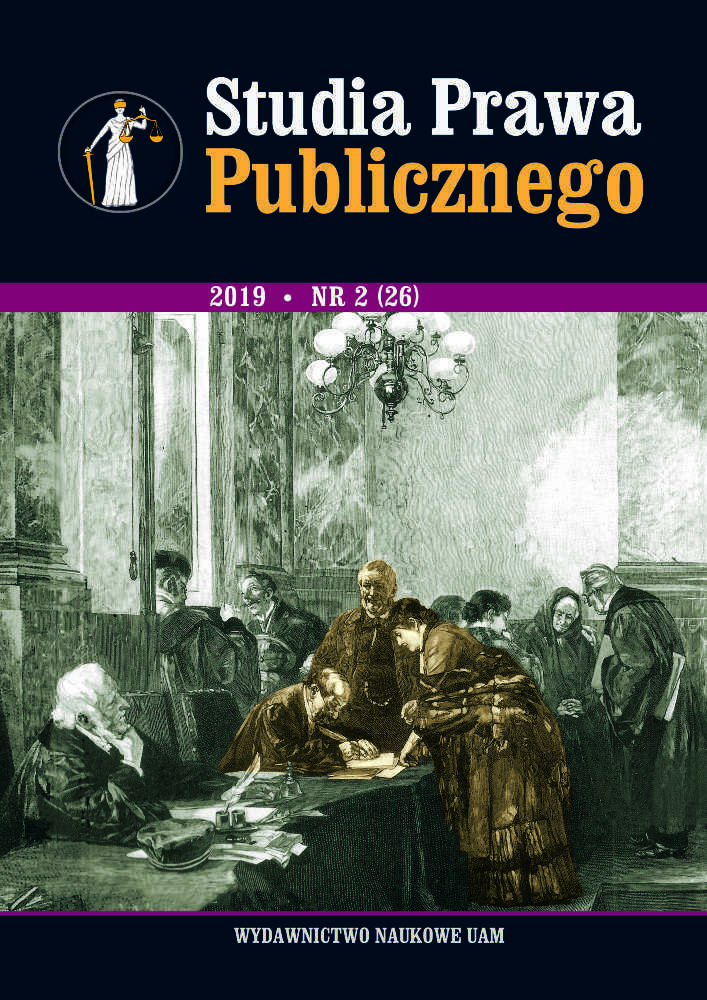Abstract
Pursuant to the amendment to the Code of Administrative Procedure, the Act of 7 April 2017 amending the Act – The Code of Administrative Procedure and certain other acts, the settling of a matter quietly has been incorporated into the framework of this Code. The legislator reserved a peculiar procedural regime for cases settled quietly, based on the formula of simplified, de-formalised proceedings, with simul-taneous setting of limits for the rights of the party in the trial. Pursuant to Article 122d § 1 of the Code of Administrative Procedure, the provisions of Articles 10 and 79a of the Code of Administrative Procedure shall not apply to matters settled qui-etly. There is no doubt that the addition to Section II of the Code of Administrative Procedure of Chapter 8a on quiet settlement of matters results in the application of the Code of Administrative Procedure to matters within this scope, including, inter alia, Article 28 of the Code – on the side of proceedings. This means that in matters settled quietly, similarly as in the case of matters settled by an administrative deci-sion, the subjective scope of proceedings is determined by Article 28 of the Code of Administrative Procedure, stating that each party is a party whose legal interest or duty the proceedings relate to, or who demands the authority to act due to its legal interest or duty. At the same time, the reservation made in Art. 122a § 2 of the Code of Administrative Procedure that a case is deemed to have been settled quietly when the party’s claim has been fully accepted does not mean in practice that only homogeneous interests of the party or parties expressed in the claim are involved in the case, and that the legal interests of subjects not filing a claim will not be involved in the case. As a consequence of the above, the fundamental question arises as to what extent the provision of Article 122d(1) of the Code of Administra-tive Procedure interferes with the conventional system of guaranteeing the rights of a party or parties adopted for cases settled in the jurisdiction process. The starting point of the analysis is the identification of the basic standard for determining the procedural position of a party in administrative proceedings, and then confronting with the solutions of the institution of quiet settlement of the matter in the scope different from the standard.
References
Chróścielewski W., W sprawie projektu nowelizacji przepisów k.p.a. dotyczących postępowania ogólnego opracowanego w Ministerstwie Spraw Wewnętrznych i Administracji w 2009 r., w: Instytucje procesu administracyjnego i sądowoadministracyjnego. Księga jubileuszowa dedykowana Profesorowi Ludwikowi Żukowskiemu, Przemyśl–Rzeszów 2009.
Chróścielewski W., Dańczak P., Tarno J.P., Postępowanie administracyjne i postępowanie przed sądami administracyjnymi, Warszawa 2018.
Duniewska Z., Ignorantia iuris nocet w prawie administracyjnym, Łódź 1998.
Gajda-Durlik M., Zasady ogólne postępowania administracyjnego a zasady ogólne postępowania cywilnego, w: System prawa administracyjnego procesowego, pod red. G. Łaszczycy, A. Matana, t. 2, cz. 2: Zasady ogólne postępowania administracyjnego, pod red. J.P. Tarny, W. Piątka, Warszawa 2018.
Grzegorczyk P., Weitz K., Art. 45 ust. 1 i 2, w: Konstytucja RP, t. 1, pod red. M. Safjana, L. Boska, Warszawa 2016.
Górzyńska T., Prawo do informacji i zasada jawności administracyjnej, Kraków 1999.
Iserzon E., Art. 8, w: E. Iserzon, J. Starościak, Kodeks postępowania administracyjnego. Komentarz, teksty, wzory i formularze, Warszawa 1970.
Janowicz Z., Ogólne postępowanie administracyjne, Warszawa–Poznań 1978.
Janowicz Z., Kodeks postępowania administracyjnego. Komentarz, Warszawa 1996.
Kamińska J., Rozbicka-Ostrowska M., Ustawa o dostępie do informacji publicznej. Komentarz praktyczny, Warszawa 2008.
Kędziora R., Kodeks postępowania administracyjnego. Komentarz, Warszawa 2017.
Kmieciak Z., Ogólne zasady prawa i postępowania administracyjnego, Warszawa 2000.
Knysiak-Molczyk H., Uprawnienia strony w postępowaniu administracyjnym, Zakamycze 2004.
Koncewicz T.T., Aksjologia Unijnego Kodeksu Proceduralnego, Warszawa 2010.
Koncewicz T.T., Sądowa sprawiedliwość proceduralna w prawie europejskim, „Gdańskie Studia Prawnicze” 2016, t. 35.
Krawczyk A., Standardy współczesnej regulacji postępowania administracyjnego, w: Prawo procesowe administracyjne, seria System prawa administracyjnego, pod red. R. Hausera, Z. Niewiadomskiego, A. Wróbla, t. 9, Warszawa 2017.
Łaszczyca G., „Stan wyższej konieczności” w ogólnym postępowaniu administracyjnym, „Samorząd Terytorialny” 2007, nr 4.
Łazarska A., Rzetelny proces cywilny, Warszawa 2012.
Łętowski J., Rada Europy o postępowaniu administracyjnym, „Annales Universitatis Mariae Curie-Skłodowska. Sectio G. Ius” 1993, t. 40, nr 12.
Piecha J., Art. 122d § 1 i 2, w: Kodeks postępowania administracyjnego, Komentarz, pod red. R. Hausera, M. Wierzbowskiego, Warszawa 2017.
Rozmaryn S., O zasadach ogólnych kodeksu postępowania administracyjnego, „Państwo i Prawo” 1961, z. 12.
Sawuła R., Audiatur et altera pars w procesie administracyjnym i sądowoadministracyjnym, „Casus” 2010, nr 55.
Sibiga G., Dostęp do informacji publicznej a prawa do prywatności jednostki i ochrona jej danych osobowych, „Samorząd Terytorialny” 2003, nr 11.
Sibiga G., Udostępnianie akt sprawy a udostępnianie danych osobowych, „Samorząd Terytorialny” 2003, nr 23.
Służewski J., Postępowanie administracyjne, Warszawa 1982.
Smoktunowicz E., Orzecznictwo Sądu Najwyższego i Naczelnego Sądu Administracyjnego. Kodeks postępowania administracyjnego, Warszawa 1994.
Tarno J.P., Zasady ogólne k.p.a. w orzecznictwie Naczelnego Sądu Administracyjnego, „Studia Prawno-Ekonomiczne” 1986, t. 36.
Wierzbowski M., Rozdział II Zagadnienia ogólne. § 5. Zasady ogólne, w: Postępowanie administracyjne – ogólne, podatkowe, egzekucyjne i przed sądami administracyjnymi, , M. Szubiakowski, M.Wierzbowski, A. Wiktorowska, pod red. M. Wierzbowskiego,Warszawa 2008.
Wiktorowska A., Zasada przekonywania w Kodeksie postępowania administracyjnego, w: Współczesne zagadnienia prawa i procedury administracyjnej. Księga jubileuszowa dedykowana Prof. zw. dr. hab. Jackowi M. Langowi, pod red. M. Wierzbowskiego, J. Jagielskiego, A. Wiktorowskiej, E. Stefańskiej, Warszawa 2009.
Wróbel A., Komentarz do art. 122d § 1, w: Kodeks postępowania administracyjnego. Komentarz, pod red. A. Wróbla, M. Jaśkowskiej, Warszawa 2018.
Zimmermann J., Motywy decyzji administracyjnej i jej uzasadnienie, Warszawa 1981.
Zimmermann J., Administracyjny tok instancji, Kraków 1986.
License
Copyright (c) 2019 Małgorzata Gajda-Durlik

This work is licensed under a Creative Commons Attribution-NonCommercial-NoDerivatives 4.0 International License.

